Richard Dee's Blog, page 67
January 15, 2020
The Indie Showcase presents, Rebecca Marsh.
Please welcome this week’s guest to the Showcase.
Living the dream—a new dream

Like
a lot of writers, I began writing when I was young—twelve-years-old. I found a
lot of enjoyment in writing and I thought the stories in my head might someday
bring me fame and fortune. It’s not really unusual for a kid to have inflated
ideas about what life might bring them and even adults often don’t realize that
most writers don’t make a lot of money and aren’t famous. I didn’t know much
when I finished my first novel and began learning about the publishing process.
But little by little I began to realize that my dreams would need some
revising.
At
first, I didn’t like the idea of self-publishing my book. I wanted to get paid,
not pay for everything myself (who wouldn’t?). Besides that, I know nothing
about marketing. But time went by with me sending out queries and nothing
really happening. I got a few bites, but that was all. I certainly didn’t
exhaust all avenues on the road to mainstream publishing, but as time went on
and my book was still just sitting there in my computer, I started to rethink the
self-publishing route. Everyone I had given the book to had given me very
positive feedback and I believed that it was a good story. I started going to
meetings with my local writer’s guild (they are awesome!) and listened to their
experiences with self-publishing and I did some of my own research. Then I
asked myself a question: what would it take to make self-publishing my novel
worth it?
When
I really took some time and thought about it, I realized that the answer to the
question was simple. If one person read my book and it meant something to them,
then it would be worth it. That was my new dream. It wasn’t about money or
notoriety. The most important thing was for people to read the book and get
something out of it.
I
think all of us, as we grow older, find that our dreams have to transform into
something different than we ever thought they would be. In my case, the new
dream is far better anyway. I’m glad I decided to take the leap. Three years
ago, most of the people who know me didn’t even know I was a writer. I didn’t
share that with a lot of people. However, the response I’ve gotten from readers
who know me and also those who don’t, has been so uplifting. I can tell you
about so many moments that have made stepping out into an unknown realm so worth
it!
The first time I got a review back from a book blogger was one such moment. I was so nervous to see what he had to say about the book. My heart swelled when I read the positive review. Every time a reader reaches out to tell me they enjoyed one of my books or leaves a review, I know I made the right choice.
I
published my first book, When the Storm Ends, in September of 2018.
Blurb
for When the Storm Ends:
Beth
thought her violent childhood was something she left in the past—until she met Erin.
Now the abuse of her step-father has returned in terrifying nightmares.
Beth became a child psychologist so she could help children who are broken and
hurting, but Erin, the fifteen-year-old who killed her father, is different. If
Beth can’t reach her and find out why she did it, Erin will spend the
rest of her childhood behind bars. To most people, it looks simple—Erin is
either crazy or evil, but when Beth looks into Erin’s haunted eyes, she’s sure
that something terrible was done to this girl. Erin, however, isn’t talking.
Beth believes Erin might open up to someone with whom she feels a kinship. Of
course, Beth knows she shouldn’t share her own past with a patient, but the
clock is ticking toward Erin’s trial, and Beth is out of options.
Little does Beth know that taking this terrifying leap will not only reveal the truth about Erin, but will rip Beth’s past wide open as well—and a connection between them that will shake Beth to the core.
My second book, The Rift Between Us, was
published last July.
Blurb
for The Rift Between Us:
After a family dinner turns into a bitter
fight, sisters Maria, Lauren, and Avery decide to go their separate ways. Their
father warns them that someday they will need one another. When he dies
suddenly, they learn that he intends to make sure that they do. He’s left them
a substantial inheritance, far more than any of them ever imagined.
There’s just one catch. If they want the
money, they will have to spend two weeks together at a secluded lake house and
follow all of their father’s instructions—no matter how strange.
Their task seems simple enough, but each one is holding onto painful secrets and old grudges the others know nothing about. But if they can learn to trust each other again, they might be able to mend the rift between them and give their father his dying wish.
Here’s an excerpt for a sneak peek of my next book which is still in need of a title:
Marissa’s
panic grew. She began pushing her way through the crowd, not even hearing the
protests that were called out.
When she reached the center of the
crowd, she could see the legs of a man sticking out from behind the lifeguard
who was performing CPR. Marissa sucked in a breath. She didn’t need to see his
face. Staring at the bright red swim trunks, she knew right away it was Kevin.
Marissa stood there frozen as if time was going on without her. She
wanted to scream, but no sound would come out. She couldn’t move. She could
barely breathe.
The sound of a siren echoed out
through the wind, coming closer.
In seconds EMTs were running up to the crowd and pushing through. When they got to the center, the lifeguard stood up. He moved aside, giving Marissa a clear view … and her world shattered.
I hope you’ll consider giving one of my current
books a try and if you’d like to keep up with me and when the next one is
coming out, you can follow me using these links:
My website: https://www.rebeccalmarsh.com/
My Facebook page: https://www.facebook.com/RebeccaLynnMarsh/
Many thanks to Richard for offering this opportunity to get the word out about my books!!
My thanks to this weeks guest for a great post. I hope you all enjoyed it.
While you’re here, why not have a look around the site? There are FREE things and a whole lot more, just follow the links at the top of the page.
You might also like to join my team. I’ll send you a bi-monthly newsletter, filled with news, updates and extra content, as well as more about me and my worlds. You’ll also get a free short story and offers on my novels. Subscribe by clicking HERE
If you want to be
featured in a future Showcase, where you can write about whatever
(within reason) you want, then please let me know. Use the comment box below
and I’ll get back to you.
You can catch up on
previous Showcase posts by clicking HERE
Don’t miss the Saturday Rewind, next Thursdays Showcase post, and my musings every Monday.
Have a good week,
Richard.
133 total views, 132 views today
The post The Indie Showcase presents, Rebecca Marsh. appeared first on Welcome to the worlds of Richard Dee..
January 13, 2020
What I’ve been doing in the background.
It’s time for the big reveal, the reason I’ve been spending a lot of time away from social media.
I’ve been working on a new project, and not one of my own. At least, not exclusively.
As some of you will know, I’m a member of the Exeter Authors
Association, a local writing group.
One of us, and I can’t remember who; had this crazy idea for us to write an anthology of our work, a short story or factual piece each, collect them together and make them into a book.
We could sell it to raise our profile as a group. Maybe make some money for charity as well as for ourselves? We thrashed it around over several meetings and the project was born.
What could we write about? To keep it unique to us, as the EAA, we decided that every contribution had to be Devon themed, either set in or about the county.
Our members write such a range of genres that there was sure to be something in it for everyone.
Because I had been involved in another such project, called 1066
Turned Upside Down, it was decided that I had all the qualifications to be
in charge!!!!!
I started getting people to contribute, wrote a couple of
short stories myself. With the help of other members, we set about deciding on
a cover image and all the myriad of details that make a new book.
Tales of Deepest Darkest Devon is the result. We
decided on the Devon Air Ambulance Trust as a worthy place to donate some of
the profits as one of our members is associated with the charity.
Somehow, we have nineteen pieces of fact and fiction, all assembled and ready to be released as an eBook on March 31st. The paperback will follow in due course.
It’s been a real collaboration; everyone has pulled together
and made a valuable contribution.
So, without further ado, here is the blurb and cover.
Blurb
Devon; a land of
beauty, of moors, villages and coasts. A place of stories, told by the people
who live there.
Take a look beneath the surface of Devon with the
Exeter Authors, nineteen tales from thirteen of the county’s finest writers.
Contains some adult (18+) material.
Bobbing. Discover why
revenge is a dish best served with cider,
Make a wish. Devon is the
place to spend the rest of your life.
The Dartmoor Dragon. Discover the
magic on the moor.
Cutty Dyer. Quiet villages can hold deadly secrets.
Winter Snow. The old ways are the best.
The Padding Horror. On the moors,
an ancient evil is stalking its latest prey.
Under the Hunters Moon. You’re never truly alone on the moor.
The Fairmile Green Man. Has Swampy
and his protest been forgotten? A green man carving brings a much older story
back to life.
Guardians. A peaceful
little village hides a dark secret.
And many more.
Contributors: Jenifer Braund, Richard Dee, Maura Beckett, Chip Tolson, Brian Willis, Janet Few, John Hall, K. Y. Eden, Richard Lappas, Tracey Norman, Mark Norman, P.J. Reed, Jenny Kane.
Part of the sale price goes to the Devon Air Ambulance Trust.
And the front cover.
Designed by me, with the background of a map that another member found.
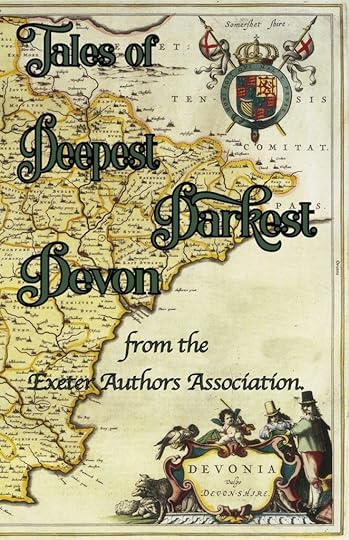
You can pre-order a copy of the eBook at http://mybook.to/Deepest_Darkest_Devon
I’d love to get your comments, please leave them below. While you’re here, why not take a look around? There are some freebies and lots more content, about me, my writing and everything else that I do. You can join my newsletter for a free short story and more news by clicking this link.
161 total views, 161 views today
The post What I’ve been doing in the background. appeared first on Welcome to the worlds of Richard Dee..
January 12, 2020
World-building. Using what you have.
I thought it was time for me to blog a little bit more about my world-building methods. It’s a subject that I find as fascinating as writing the actual story. In fact, I’ve grown to love the act of creating a world and making it come alive. Which is surprising, when I started writing I found it tedious and overcomplicated, almost a barrier to my progress as an author.
I found that I was forever having to justify the action in terms of the world I had created. There was a butterfly effect in progress, my plot demanded a thing which meant I had to change my world, which meant a modification of something else………
Clearly this wasn’t the best way to write, I spent a lot of time thinking about world-building before I wrote my second book. It’s also led me to write a textbook on the subject, a sort of Creating a Universe 101.
Back to the world-building.
Even though my sci-fi novels are set in different universes,
different time periods and with different themes, there are things that connect
them, despite there not being any apparent points of contact.
The thing is, once I’ve created part of a world; if it works
and makes sense, it seems silly not to use it somewhere else.
I’m not just referring to the big stuff either. While things like means of transport, types of planet or pieces of equipment are common across my Sci-fi worlds so are the little things too. I don’t see the logic in inventing a whole new way of doing everything for each separate universe; unless it’s a thing that’s central to the plot.
I’ve been to all the trouble of inventing these things,
spent ages scouring technical websites, magazine and reference books, to ensure
that everything I put into my novels has a basis in fact. If I can use it in more
than one place, then it’s value for money as far as I’m concerned. At the end
of the day, people have to live, eat and travel in all of my worlds,
irrespective of time or place; why not use the same means to achieve those
ends.
Hence all my spaceships use a device that I called the Padget Inverter to travel faster than light. This was my way of putting two fingers up at Einstein (in the nicest possible way) and avoiding the methods used by other authors to get around the Galaxy. I justified the way it worked in a short story, The tale of Christopher Padget, which you can find in my collection Flash Fiction.
As Klaatu said in The Day the Earth Stood Still. (The original and best version)

I find it works well enough to get me from one planet to another.
Why should I bother inventing another way to do the same thing just because the book has a different title?
My galactic explorers need food,
so I have perfected the concept of the farm in space, on space stations in Andorra Pett and the Oort Cloud Café and my short story The Orbital Livestock Company (FREE for subscribers). I have farms on airless planets in Andorra Pett on Mars and Ribbonworld.
Not only crops, animals and fish can be grown on the farms, there really are no limits. It also solves the problem of getting food delivered from Earth when you’re on the other side of the Galaxy.
I spent a lot of time researching the concept; using real-life farming techniques and theories of soil structure, hydroponics and crop nutrition. I know it sounds realistic and more importantly, would work in practice. I wrote more about farming in space HERE
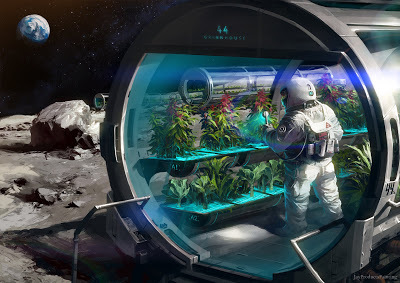
And then there are the incidental bits of technology, the small things that add authenticity. Today, they would be things like a mobile phone, a wireless connection or a reusable coffee cup, everyday stuff that you hardly notice. In my future, we have upgraded versions of them, familiar yet different. As well as the new devices you’ll need for your future, there are things that we could have today if only we could be bothered to make them, Chargers for electronics that are powered by running water, square cups so you can carry four easily. That sort of thing.
While we’re on the subject,
probably about 90% of what we will have in the future we already have now. If you think about it, we could live on many an alien planet if we could get to it, we already have the means to survive extremes of pressure and temperature. All we lack is the ability to go and a place to go to.
The only thing you need to alter with today’s technology is perhaps a fancier case or a few extra functions that could be relevant to the plot. The basic idea is still relevant.
A lot of the devices I invent (if that’s not too strong a word) are things that I would like to see now. Take Glasswall for example. First seen in my novel Jungle Green, it’s a system of cameras mounted on the outside of a spaceship, they project an image of what’s outside onto the inside of the hull. It removes the need for windows (portholes) and has all sorts of other uses. I liked it so much that I’m fitting it on all the spaceships in my fleet.
But, where you can really go to town is in a Steampunk world. I spend ages inventing new ways to do what we do now, only without the advantages of modern methods. And once you get over the lack of oil or electricity, it becomes obvious that you don’t actually need these things to function as a technological society. They make life easier but that’s about it.
That’s the topic for next week’s post.
Finally, current thinking also influences my writing.
You can spot trends and make them a part of your future. Things like alternative energy sources; mans effect on the climate and preserving ecology. Topical issues that, again, serve the purpose of making your future believable. It’s interesting to take today’s problems and see what the inhabitants of my future worlds have made of them.
Have they solved them or have they ignored them and moved on? In fact, the possibilities for introducing new solutions to old problems can be a great source of inspiration. It can also drive the plot or motivate your character’s behaviour.
I’d love to get your comments, please leave them below. While you’re here, why not take a look around? There are some freebies and lots more content, about me, my writing and everything else that I do. You can join my newsletter for a free short story and more news by clicking this link.
229 total views, 226 views today
The post World-building. Using what you have. appeared first on Welcome to the worlds of Richard Dee..
January 10, 2020
Book Review, The Magisters (book one) by Jack Eason
The Magisters is a science fiction story with a difference.
Apart from chronicling the ultimate change of life for a select few individuals, it questions all accepted ideas by closeminded academics that leave no room for alternative thinking by some among their number. It is also about a woman born ten years after the Romans left Britannia forever and a man born in the twentieth century. Add to that everything that is currently environmentally wrong with our planet today, and you have all the necessary ingredients for an enthralling tale. Now read on…
My Review
The Magisters is a well-told tale; based on a lot of what we think we know about our past. What is the real purpose of a collection of monuments scattered over the globe? Are the things we believe really true? With Jack’s usual flair he blurs the line where his imagination takes over from the history we have been taught, leading us into what might happen next and why. He addresses important issues in this fast-moving story, the end of which suggests that book two will be forthcoming.
Soon, please.
Four Stars.

I’d love to get your comments, please leave them below. While you’re here, why not take a look around? There are some freebies and lots more content, about me, my writing and everything else that I do. You can join my newsletter for a free short story and more news by clicking this link.
209 total views, 209 views today
The post Book Review, The Magisters (book one) by Jack Eason appeared first on Welcome to the worlds of Richard Dee..
January 8, 2020
The Indie Showcase presents, P.J. MacLayne
Please welcome the first guest of 2020 to the Showcase

At the age of eighteen, thanks to the Irish Rovers, I met the unicorn that inspired my first attempt at writing a book. It was high fantasy, but of course, I didn’t know that back then. I also had no idea about writing in chapters, the number of words expected, head-hopping, all the usual hazards. All I knew was that I wanted to get a story down on paper.
And
I did. With paper and pen and pencil. I was in way over my head and knew it. I
did it anyway. Justifiably, I was proud of myself, even though I knew the finished
product lacked a good opening and was burdened by a few weak plot points. I
still have that manuscript, somewhere.
I
didn’t try to write another book for—let’s just say lots of years and leave it
at that. I had some minor success with poetry and it fed my creative spirit for
a long time. At least one of my poems survives in an internet archive of a
magazine.
One day I heard about this thing called NaNoWriMo, a challenge to write 50,000 words—a book, basically—in one month. I had a story bumping around in my head that wouldn’t fit into a poem, and the challenge sounded like fun, so I decided to give it a try.
Well,
fun may not have been the right word for the experience. And I didn’t “win’ by
getting 50,000 words on paper. At least I tried. And it got me hooked.
Three
books later and I finally wrote one that I thought was worth publishing. Which
led to the inevitable question—how the heck does that work? I knew the basics
about agents, publishing houses, and cover letters, but not the nitty-gritty
details.
So I hit the internet to get the information. That’s when I realized the time frames involved and was also introduced to the concept of indie publishing. That’s when I decided I was too darn old to wait for a traditional publishing route and started to figure out how to go about being an indie author.
There were things I missed before I published my first book. We’ll get to those later. First, here’s a short snippet from that first published book, Wolves’ Pawn.
She
needed to get away from West Virginia and into the mountains of Pennsylvania.
That was her home turf, and she would hole up there and try to again figure out
why she was being chased. She owned nothing of value to be stolen, only her
clothes and her ring, and her clothes needed to be washed. Tonight she’d make
camp by a creek and rinse them out. Luckily, her ponytail had stayed in its
wrappings, so her hair wasn’t too much of a mess. Raiding the bearded one’s
wallet had supplied her with enough cash for gas and a little extra. To go back
to her old campsite for the rest of her meager belongings presented too big of
a risk.
The biggest problem as always was
food. Changing used a lot of energy, and between shifting and the chase she had
used up most of her reserves. It was too early in the year for berries, and she
had no time to set snares for rabbits or squirrels. No, she would just have to
do with whatever she bought from a convenience store. She longed for a rare
steak to satisfy the blood lust licking her paw had awakened, but she hadn’t
found a gas station yet selling them. She sighed. Beef jerky would be on the
menu.
Sitting by the barest of fires after dark, she decided the time had come to change her human appearance. Cut her hair short, maybe dye it red. She wondered how that would affect her wolf aspect. She could see the tabloid headlines now. “Rare red wolf spotted in the Allegheny Mountains” and underneath the article would begin “Hunters are requested not to try and capture this animal, but to report its location to the Game and Fish Commission.” Then a paragraph speculating on some Native American prophecy. She laughed, a lonely sound in the night woods, leaned against a handy tree, and fell asleep.
What
did I learn from publishing this book?
First,
publicity is hard. Harder than writing, in my opinion. I’m an introvert
and having to put myself out there to sell my book is hell. Well, close to it. And blog tours never worked for me. I
think, with the first book, I hit the end of the road, just when they lost
their effectiveness. They are still great for name recognition, not so great
for selling books.
Next,
editing. Edit, edit, edit. And as good as the books are for self-editing, don’t
think they will solve all your problems. You’ve got to have human eyes (not
just yours!) on your writing. More than one pair, preferably. And not your
mother or your best friend, unless they happen to be writers or editors as
well. There will still be mistakes missed, but the number will be minimized. (I
love finding errors in books that come from traditional publishing!) My first
book went through about three rounds of edits, now I do five or six rounds per
book.
Let’s
talk about two things I wouldn’t change, covers and formatting. I don’t even
pretend to think I could design a good cover. What fonts to use? What color
works with what color? Where to place images? Not my expertise. I passed my
cover design off to a graphics artist. We worked together on the concept, but
she’s the one who pointed me which way to go and made the vision into reality.
I’ve used her for the covers for all my books.
And
formatting? Sure, I could learn to do it. But back when I was researching how
to get my books “out there,” I decided to pay to have it done. Having someone
experienced with the different formats needed for various retailers do the work
sounded like a bargain when I considered how much time it would take me.
What else? I got much better at listening to my characters. I’m a pantser- that means I don’t work from a fleshed-out outline. But the small story arch I’d developed for this book went out the window once I got to know my characters. When I started writing my next story, that ability saved me. It started as a paranormal romance called “The Ghost Who Loved Me” and ended up as an almost-cozy mystery named “The Marquesa’s Necklace.” Here’s a snippet that pays homage to its roots.
“The
library is haunted? Nobody ever mentioned it when I worked here.”
Janine leaned across the table and
lowered her voice. “That’s what she claims. She said back in the 1920’s,
shortly after the library opened, a man who taught English at the local high
school dated one of the librarians. According to the story, she broke off the
relationship after a few dates. He tried to win her back, but she didn’t want
anything to do with him. In fact, she started seeing the owner of Mitchell’s
department store. According to Mabel, the teacher committed suicide. Hung
himself off the second floor railing the same day as the librarian and the
businessman got married.”
We both raised our faces towards the spot and a chill ran down my back. Janine knew a lot for someone who didn’t listen. “Mabel said that every few years, there’s a report of a man on the second floor after the library closes. Someone dropping books in the after-hours book drop sees something and calls the police. The police can never locate anyone inside. The stories say the man always wears a brown suit.”
If
you’re looking for a moral to this long-winded tale, you’re going to be
disappointed. There isn’t one. Except maybe the ones that the unicorn taught:
Find your voice and your passion. There’s magic inside of you and dreams can
come true.
You
can find my books at the links below. Each of the books of the Free Wolves
series can be read as a stand-alone story. I do suggest that the Harmony Duprie
mysteries be read in order. They don’t contain cliffhangers but are
chronological. I’ve listed the Amazon links, but they are also available on
iTunes, Nook, and Kobo. Or you can just check them out on my website! (listed
below)

The Free Wolves https://www.amazon.com/gp/product/B07YZM9DB7? (Wolves’ Pawn, Wolves’ Knight and Wolves’ Gambit)

The Harmony Duprie Mysteries https://www.amazon.com/gp/product/B074C6CTKP? (The Marquesa’s Necklace, Her Ladyship’s Ring, The Baron’s Cufflinks and The Contessa’s Brooch)
Author Bio:
Born and raised among the rolling hills of western Pennsylvania, P.J. MacLayne still finds inspiration for her books in that landscape. She is a computer geek by day and a writer by night who currently lives in the shadow of the Rocky Mountains. When she’s not in front of a computer screen, she might be found exploring the back roads of the nearby national forests and parks. She writes the Harmony Duprie Mysteries (not-quite-cozy) and the Free Wolves Adventures. (urban fantasy/paranormal)
Links:
Website: http://pjmaclayne.com
Facebook https://facebook.com/pjmaclayne
Twitter https://twitter.com/pjmaclayne
Amazon http://www.amazon.com/P.J.-MacLayne/e/B00HVE8WZI
BookBub https://www.bookbub.com/profile/p-j-maclayne
Newsletter http://eepurl.com/cL73Cz
My thanks to this weeks guest for a great post. I hope you all enjoyed it.
While you’re here, why not have a look around the site? There are FREE things and a whole lot more, just follow the links at the top of the page.
You might also like to join my team. I’ll send you a bi-monthly newsletter, filled with news, updates and extra content, as well as more about me and my worlds. You’ll also get a free short story and offers on my novels. Subscribe by clicking HERE
If you want to be
featured in a future Showcase, where you can write about whatever
(within reason) you want, then please let me know. Use the comment box below
and I’ll get back to you.
You can catch up on
previous Showcase posts by clicking HERE
Don’t miss the Saturday Rewind, next Thursdays Showcase post, and my musings every Monday.
Have a good week,
Richard.
163 total views, 160 views today
The post The Indie Showcase presents, P.J. MacLayne appeared first on Welcome to the worlds of Richard Dee..
January 7, 2020
Insecure Writers Support Group Blog Hop
This is a new departure for me, my first contribution to the Insecure Writers Support Group Blog Hop.
I’ve looked at what others did last month and tried to do the same here. If you’re reading this, I guess it must have worked.
First, the ISWG preamble
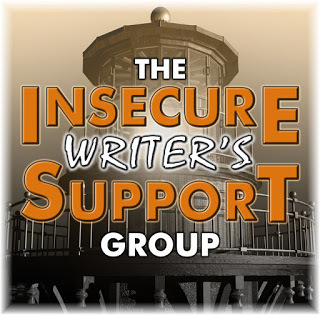
Purpose: To share and encourage. Writers can express doubts and concerns without fear of appearing foolish or weak. Those who have been through the fire can offer assistance and guidance. It’s a safe haven for insecure writers of all kinds!
Posting: The first Wednesday of every month is officially Insecure Writer’s Support Group day. Post your thoughts on your own blog. Talk about your doubts and the fears you have conquered. Discuss your struggles and triumphs. Offer a word of encouragement for others who are struggling. Visit others in the group and connect with your fellow writer – aim for a dozen new people each time – and return comments. This group is all about connecting! Be sure to link to this page and display the badge in your post. And please be sure your avatar links back to your blog! Otherwise, when you leave a comment, people can’t find you to comment back.
Let’s rock the neurotic writing world!
Our Twitter handle is @TheIWSG and hashtag is #IWSG.
Every month, we announce a question that members can answer in their IWSG post. These questions may prompt you to share advice, insight, a personal experience or story. Include your answer to the question in your IWSG post or let it inspire your post if you are struggling with something to say.
The awesome co-hosts for the January 8 posting of the IWSG are T. Powell Coltrin, Victoria Marie Lees, Stephen Tremp, Renee Scattergood, and J.H. Moncrieff!
January 8 question – What started you on your writing journey? Was it a particular book, movie, story, or series? Was it a teacher/coach/spouse/friend/parent? Did you just “know” suddenly you wanted to write?
Here’s my contribution.
Why did I become a writer? This is what I tell everyone who asks.
I was never a writer.
I was a reader, right from the day that the squiggles on the page made sense. I was a devourer of the words of others. I grew up and became a captive audience, a traveller in ships of metal, crossing the oceans with goods for trade. It was just me and the sea and a library of other people’s books.
You joined the ship with a book, you left it behind. Part of you travelled on just as part of others accompanied you. There were as many different books as there are seafarers, but they all had a tale to tell. And with time on my hands, I read every one that I could.
I was never a writer, I wrote short, stilted letters home. I saw the wonders of the deep and could only say that it was sunny. I never put into words the things I saw, the majesty of soaring, sunlit clouds, a green flash at sunset, the countless stars or the frolicking dolphins. I smelt sandalwood on the breeze, explored distant lands and kept it to myself.
Yet…, somewhere, a part of me must have been paying attention, filing it all away.
Then one day, I tired of it all, I hung up my sextant and left it all behind. I swapped my rolling deck for a stationary desk.
I had a life, I did other things, I was still a reader, maybe not so much, family life saw to that. But when I could, I’d escape into another world, a world created in someone else mind. And without letters to write home, I wrote reports instead, factual accounts of what I had done, official prose. I found them hard to write. Because I was never a writer.
Then, one day, I had a dream, I was in it, but it was set in a different place. I was moving cargo around again, I had just exchanged my ship on the water for a ship in space. The cargo was the same and a lot of the routine was similar. In my dream, I was Dave Travise, a loner with only the regrets of his past to keep him company.
I had the dream again and again.
In the end, I wrote my dream down, it took me a long while. As I wrote I remembered more of it and the account grew. I hoped that once I’d exhausted my memory, the dream would vanish and leave me alone; after all, I was never a writer.
It worked. When I’d finished, the dream stopped, as if the very act of committing it to paper had satisfied it somehow.
I got on with my life, grew old and retired.
Then, I had another dream. This one was different. I wasn’t in it. Instead, I saw a farm on another planet. I knew that I was looking at a microwave generator, whatever one of those might be, then I saw the girl. She was running for her life. I awoke feeling like I had been an invisible observer to a real event. I wrote that down too, even though I was never a writer.
Then it dawned on me, the two stories could be connected, could be part of a bigger tale. More than that, they could be added to. If only I was a writer, I could do that.
It was like opening a floodgate. I stopped having the dreams when I was asleep. Instead, I had them when I was awake, they would sneak into my head when I was doing other things. I watched a film in my head, I could slow it down and rewind it, but I could never fast forward. I typed what I saw, never looking at the words filling the screen.
Reading the pages back, when the film stopped, was a revelation.
I had created people and places, situations and…, a story. And I had done it without knowing where it would lead. Yet it all made sense. It might have needed a little tidying up, but it had a beginning, a middle and an ending. Dave Travise had come alive, he was as real as anyone in anything I had ever read. And the more I wrote, the more there was to write.
Dave Travise was joined by a host of other people, who must have been waiting in some corner of my mind.
There was Horis, from the Ministry of Coal. There was the ill-fated Myra. There was the reluctant and accident-prone amateur detective, Andorra Pett. And many others. They all had tales to tell, they jostled for time and attention, filling my mind with their exploits and keeping my keyboard clattering. I never knew what they would get up to next, never saw anything further than what was on the screen when I stopped typing and looked up. Through my fingers, they explored the galaxy, fought crime and righted wrongs. In short, they lived, they loved and all too sadly, occasionally they died. Their passing always left me with sorrow, although it hadn’t been my doing. They had decided when they had done what they needed, when it was time for them to go. They had been created in my mind, borne by my fingers, they had life and a purpose, suddenly they weren’t.
The number of novels and short stories grew, I got an editor and started to publish them myself. I lacked the confidence to ask the opinion of the experts. It was my hobby, I was never a writer.
Then the fun started. “What happens next?” asked a reader, “What happened before?” asked another, “What does this mean?” wondered a third. It surprised me that people wanted to know, that I had made them interested enough to want more. At first, I thought that it meant that I hadn’t given them enough, then I understood that I hadn’t given them too much. To explain and answer their questions, I asked the characters and via my fingers, they told me.
And they keep on telling me.
I was a writer.
I hope you enjoyed that.
I’d love to get your comments, please leave them below. While you’re here, why not take a look around? There are some freebies and lots more content, about me, my writing and everything else that I do. You can join my newsletter for a free short story and more news by clicking this link.
Check below to find the other blogs on the hop.
170 total views, 170 views today
The post Insecure Writers Support Group Blog Hop appeared first on Welcome to the worlds of Richard Dee..
January 5, 2020
My guilty secret.
Sometimes I feel like that I’m that person. The person in this sort of situation.
I walked into the room, a large, almost empty church
hall. There was a group of chairs in the middle, arranged in a circle. I could
see about ten people, the strange thing was, none of them turned to see who had
just shut the door. As I looked closer, I could see that they were avoiding eye
contact with each other too. I caught the mood of the room, like a wall, there
wasn’t a person there who wanted to be there, except one. They must be the one
in charge. I sat in an empty chair.
The person in charge looked at me, “now then everyone,”
they said, “we have a new member today, let’s all say hello and make them feel
welcome.”
There were muttered greetings, dragged from unwilling throats
by the leader’s enthusiasm.
“Great to see you here,” they continued, “please tell us
a little bit about yourself.”
I stood, gazed around, “Hello,” I said. “I’m Richard and I write Sci-Fi.”
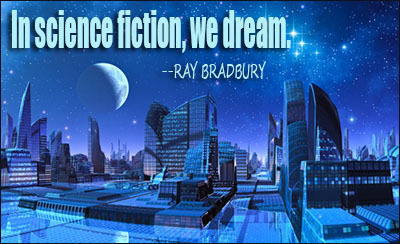 Blue Moon over futuristic City
Blue Moon over futuristic CityI don’t know about you,
but if someone told me they wrote in a particular genre; I wouldn’t say that I hated it in reply. Not online and certainly never in person. I’m far too polite, I’d probably answer in some other neutral way. I must be the exception, either that or I’m mixing in the wrong crowd.
I’ve been thinking about the reasons why people might view Sci-Fi in a negative way, I always ask why people don’t like the genre, apart from the haters with no justification apart from to say I just do, these are the general sense of the replies that I get.
It’s seen as the preserve of geeky teenagers, glued to computer screensPeople remember dire 1950s B movies, pulp novels, comic books and poorly acted TV shows with dialogue more wooden than the sets It’s not seen as proper writing, almost unworthy of being called literature.They’re put off by the word Science or the thought that they will not be able to understand the setting or the technology.
Naturally, I feel somewhat defensive about what I write.
After all, it takes me just as long to write a novel as any other author. There’s still as much research needed, if not more. It all needs to fit together and have a logical plot. It needs editing and formatting, a decent cover.
I will also defend some 1950s Sci-Fi, there were stories with a message, The Day the Earth Stood Still highlighted man’s folly, This Island Earth gave us a sympathetic view of alien life and their own struggles. Many others played on the paranoia of the Cold War or the misuse of science.
It’s also worth considering that a lot of yesterdays Sci-Fi has become today’s fact, the satellite was practically an invention of Arthur C Clarke, sci-fi predicted lasers, space travel and much more.
And
Sci-Fi is popular in stories that people might not even realise are Sci-Fi. Jurassic
Park, The Handmaids Tale, even The Time Travellers Wife; they’re all Sci-Fi.
As for the concern that Sci-Fi is too complex, is it any more so than programming the VHS used to be? Or explaining the dynamic of a multi-generational family in historical fiction?
What I really want to do is demystify Sci-Fi.
If I can make it accessible to people who wouldn’t normally read it, all well as aficionados, I consider that a job worth doing.
Because,
at the end of the day, my stories are just that, stories. They might take place
in an environment that doesn’t exist, that’s all. The stories are the same,
love, loss, revenge, a search. They all contain basic human nature and emotions,
in a new location.
As well as the space opera and the alternative history of my Steampunk adventures, I also write Crime Sci-Fi, with a reluctant amateur detective who’s out of her depth in a Sci-Fi world that she doesn’t really understand.
Which is kind of a nod to the people who are as bemused by Sci-Fi as Andorra Pett is.
Judging by some of the reviews I’ve been privileged to get; my particular brand of Sci-Fi has managed to entertain some non-Sci-Fi fans.
Remarks like these, for Andorra Pett,

I wouldn’t consider myself a sci-fi fan, but I so enjoyed this book maybe I am?
The science-fiction side of things are very well written and even believable.
I would not normally read sci-fi novels, however; I loved this book.
Firstly I want to say that even if you don’t
like Sci-Fi, don’t let that put you off giving this a go.
I will be the first to admit that I’m not a fan of sci-fi books but when I read the blurb to this one and the fact it’s also a cosy crime and funny, I just had to give it a go. I am so glad I did! I loved it from start to finish.
And for Ribbonworld,
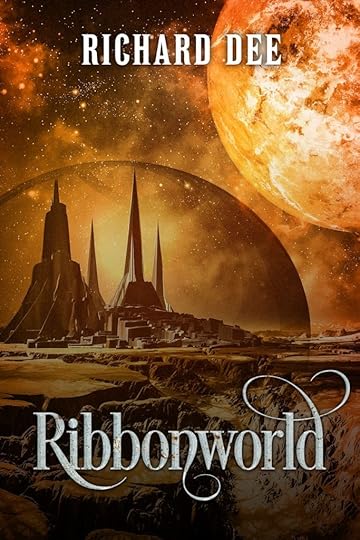
Not my usual genre, I was recommended this book by a friend. If you love sci-fi you will love this book – if like me you don’t usually read sci-fi you’ll still be drawn in by the murder-mystery thread.
Sci-fi can often be too
lacking in plot; in Ribbonworld, the author intertwines realism brilliantly
with fantastical settings to create a very compelling read.
I’m not usually a fan of Science Fiction but Ribbonworld is a thriller that would work in any genre.
Or Myra,

I don’t often read sci-fi, but found it easy to connect with the characters and the descriptions of the different galactic destinations.
I hope you get my drift. The point I’m making is that not all Sci-Fi is the same. It doesn’t have to be incomprehensible, or something that you can’t relate to.
You might already be reading it.
I’d love to get your comments, please leave them below. While you’re here, why not take a look around? There are some freebies and lots more content, about me, my writing and everything else that I do. You can join my newsletter for a free short story and more news by clicking this link.
114 total views, 114 views today
The post My guilty secret. appeared first on Welcome to the worlds of Richard Dee..
Audiobooks
One of my novels is currently available as an audiobook, the Steampunk adventure The Rocks of Aserol. It was narrated by Sam Burns at Circle of Spears, who bought it to life.
I have several other novels to convert to audio versions. To set things in motion, I offered one of them, Ribbonworld, for an audition on ACX. The actual process of doing that is refreshingly simple.
Within a few days, I had three auditions to listen to. I was taken with one in particular. Then I received this message on Facebook, from the narrator who had impressed me.
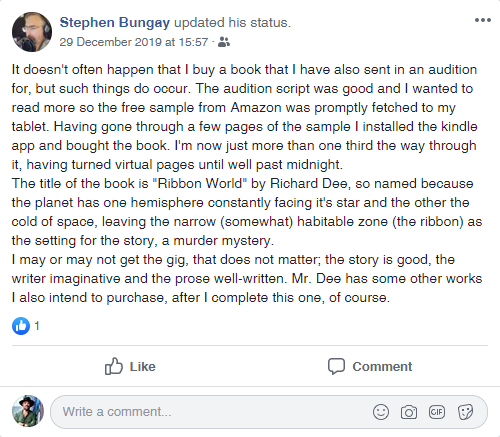
I think that his audition is worth listening to, I chose a small section with multiple characters, to see how the prospective narrators coped. Two of the three read the whole extract in a flat voice, this one introduced life into them, by giving them personality.
I had almost decided to offer the job to Stephen when I got this message.

I have made Stephen an offer, which has been accepted. I now have a fifteen-minute section of the novel to evaluate, which has generated some discussion. We now have a clear idea of the way the project will develop.
You can find out more about Stephen on his website The Soundbook Factory
I had to design a new cover, modifying the original to fit the requirements of the new format. It involved moving the writing, adding the narrator and changing the dimensions of the picture.
From this
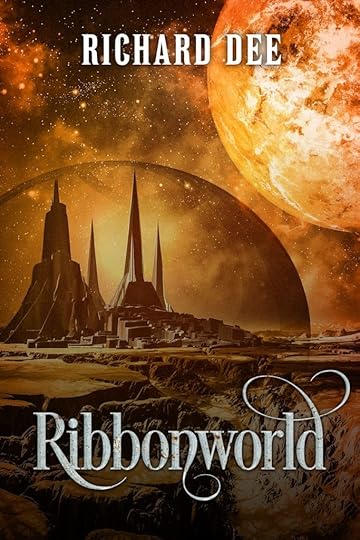
to this,

I’m hopeful that the project can be completed by the end of March, with the audiobook on sale in early April.
I’d love to get your comments, please leave them below. While you’re here, why not take a look around? There are some freebies and lots more content, about me, my writing and everything else that I do. You can join my newsletter for a free short story and more news by clicking this link.
618 total views, 207 views today
The post Audiobooks appeared first on Welcome to the worlds of Richard Dee..
January 4, 2020
Reblogging. Alison Morton, the terror of writing.
Here’s a blog post that caught my eye. Please check it out. Make sure that you leave a comment, (leave one here as well).
Let’s spread the word.
Reblogged from https://alisonmortonauthor.com/
The terror of writing
We all go through it.
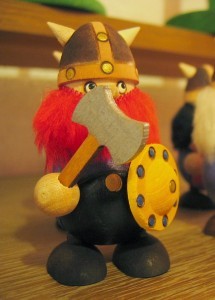
The terror of writing
You stare at the stodgy sentences. You can’t think what words to write next. You are starting to bore yourself. Your characters are boring each other. Nobody will want to read this drivel. An…
Home
90 total views, 90 views today
The post Reblogging. Alison Morton, the terror of writing. appeared first on Welcome to the worlds of Richard Dee..
January 3, 2020
Book Review, Lost Solace by Karl Drinkwater
I was pointed in the direction of this book by a new friend on Facebook. It’s what I would describe as a Military Sci-fi/ horror story and as I found out, something special.
Blurb
Sometimes spaceships disappear with everyone on board – the Lost
Ships. But sometimes they come back, strangely altered, derelict, and rumoured
to be full of horrors.
Opal is on a mission. She’s been seeking something her whole
life. Something she is willing to die for. And she thinks it might be on a Lost
Ship.
Opal has stolen Clarissa, an experimental AI-controlled
spaceship, from the military. Together they have tracked down a Lost Ship, in a
lonely nebula far from colonised space.
The Lost Ship is falling into the gravity well of a neutron
star, and will soon be truly lost … forever. Legends say the ships harbour
death, but there’s no time for indecision.
Opal gears up to board it. She’s just one woman, entering an alien and lethal environment. But perhaps with the aid of Clarissa’s intelligence – and an armoured spacesuit – Opal may stand a chance.
My Review
If I might digress for a moment, way back in 1979, I saw a
film called Alien. Today, it might seem like a lot of other films, back then it
was a revelation. It introduced the ideas of a creepy spaceship, hidden danger,
kick-ass women and an unspecified conspiracy.
Lost Solace is a book influenced by Alien, it’s unusual in
that it has only one human character for most of it, any other humans that
appear are peripheral. This could make the story boring and one-dimensional but
it doesn’t. Our human, Opal, has a past and she also has a fantastic foil in
Clarissa, the artificial intelligence of the ship she is flying at the start of
the story.
Opal is a girl on a mission; we don’t know what but it’s
clearly important to her. It’s clear that she has a past, information is passed
along sparingly, making us yearn for more.
Karl Drinkwater has a way of ramping up the tension, while at the same time creating empathy, I CARED about Opal, felt every emotion with her as she explored the lost ship and tried to solve the puzzles; aided by a snappy one-liner from the A.I. She is very believable, flawed but fascinating, as all the best kick-ass heroines are.
The location is claustrophobic, boosted by the fact that Opal is in a spacesuit, with all the limitations that brings; even if it is an advanced combat suit. There are moments of (relative) calm, interspersed with well-written action sequences to make you sit up and read faster.
The technology is well researched, plausible and deployed perfectly as the story progresses. This is not a case of always having a handy tech solution, there’s just as much emphasis on problem-solving and the clever use of sometimes meagre resources.
In the end, we get a resolution of sorts, the great news is
that there is a sequel, to continue Opal’s story.
I recommend this book. Four Stars.

I’d love to get your comments, please leave them below. While you’re here, why not take a look around? There are some freebies and lots more content, about me, my writing and everything else that I do. You can join my newsletter for a free short story and more news by clicking this link.
239 total views, 237 views today
The post Book Review, Lost Solace by Karl Drinkwater appeared first on Welcome to the worlds of Richard Dee..



